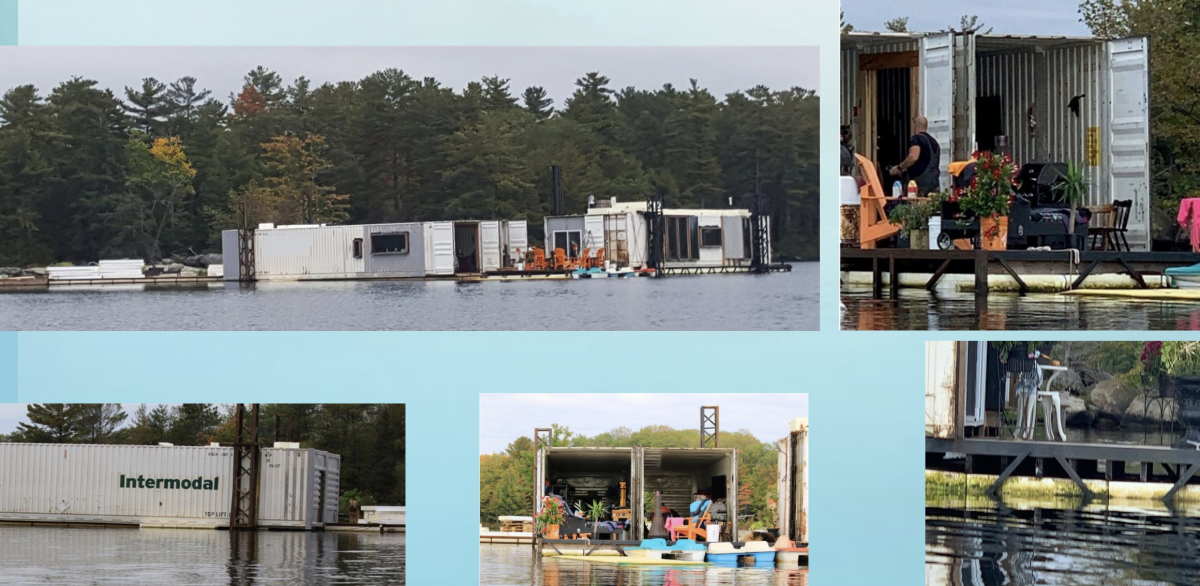Peterborough County council is endorsing a campaign by Georgian Bay Township, Ont., to ask the federal government to reclassify floating homes to allow them to fall under municipal regulations.

On Wednesday, Georgian Bay Township Mayor Peter Koetsier provided a presentation to council on the issue of floating homes, noting currently they have a “pending” classification as a vessel by Transport Canada and are regulated by the Canadian Shipping Act of 2002.
READ MORE: New Ontario rules aim to ban ‘floating accommodations’ from provincial waterways
The “contraptions,” as he called them, are a major issue on Gloucester Pool on the Trent-Severn Waterway in his township. And he says their federal classification means Ontario municipalities and agencies have no real control over them as they can drop anchor on Crown land and lakebeds on any waterway.
“It’s the biggest roadblock to managing these homes,” he said. “You’re trumped by Transport Canada — they make the decision, not anyone directly impacted by these things.”
Koetsier says the township is asking others to join them in petitioning the Ministry of Transportation to designate the floating homes as homes. That would follow federal regulations passed 20 years ago for structures along the coastline of British Columbia, which are subject to municipal permits, standards and taxation. Some floating homes in Victoria, he notes, are connected to municipal services such as water and sewer.
“What they have in British Columbia should apply cross-country,” he said. “We believe they (federal government) should consider them float homes, not vessels — therefore not enjoying the privileges that vessels have.”
Koetsier says some floating homes are also being used as short-term rentals, noting he’s aware of a commercial property owner in the Kawartha Lakes who plans to place three floating homes one metre offshore as a new Airbnb business.
He says the lack of regulation on the local level can allow some floating home owners to circumvent zoning and building codes and shoreline regulations. He considers some an “environmental hazard” with the discharging of grey water and garbage into the water. He also argues the anchored buildings can pose a safety risk to other navigators.
“We’re not saying float homes should be illegal,” he said. “We’re saying they should be subject to municipal rules and regulations just like any other home that is within our boundaries.”
In July, new regulations went into effect in Ontario that would prevent floating homes, barges with residential units or camping facilities on water over public lands. Cabin cruisers and houseboats could continue to camp on water more than 300 metres offshore for up to seven consecutive days.
Peterborough County council endorsed the presentation. Municipality of Trent Lakes Deputy Mayor Carol Armstrong noted council has previously been vocal about the issue to try to prevent a “proliferation” in the area’s lakes and waterways.
“It hasn’t really come here yet but we certainly have the same concerns as you have with the environment, safety and more,” she said.
However, she was concerned that even if there’s a federal reclassification, many municipalities won’t have the resources or capability to enforce floating homes.
Koetsier said it was a legitimate concern and that each municipality could choose how to enforce its bylaws. He noted his township has assistance from the Ontario Provincial Police.
“Each municipality has their own unique circumstances,” he said.
North Kawartha Township Mayor Carolynn Amyotte says she supported working with Georgian Bay Township and the federal ministry to address the current “loophole.”
“Clearly we haven’t solved the issue with the provincial regulation,” she said. “Right now, if we don’t do something or look to have some kind of regulation, we’re still going to be in the same position where we have no right to enforce anything.”
Koetsier says he wants townships to review their floating home bylaws to prepare for a possible reclassification as his township has already done.
“They already have the regulation — they just need a minor edit,” he said.
In late June a spokesperson for federal Transport Ministry said the government is “reviewing the regulations to assess any potential federal actions” for floating homes.
— with files from The Canadian Press



Comments